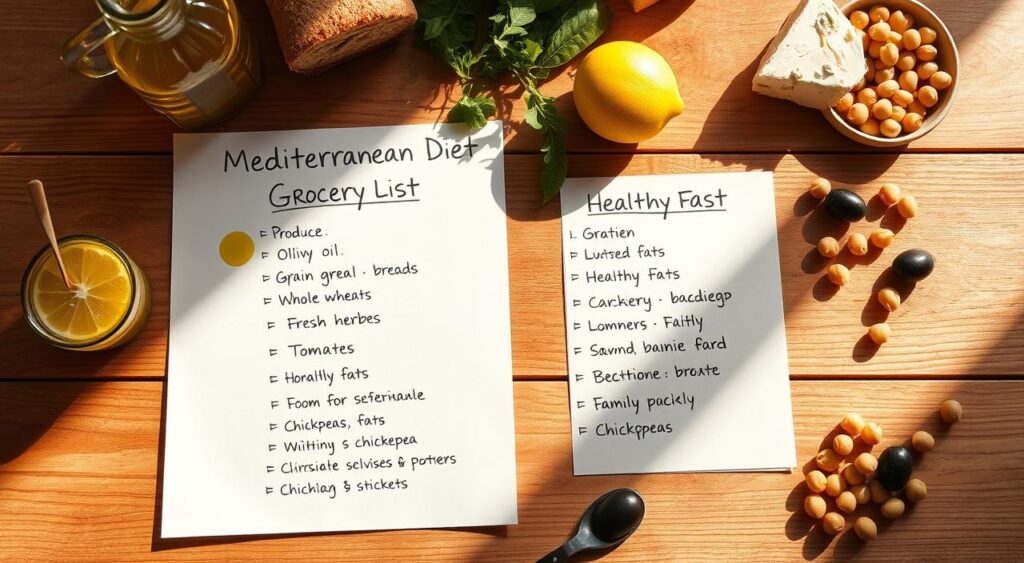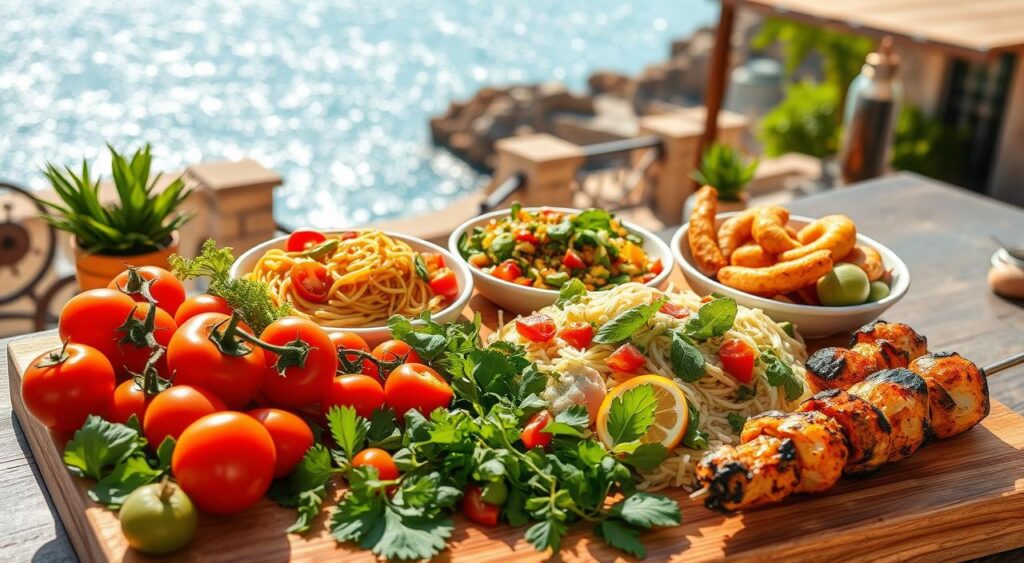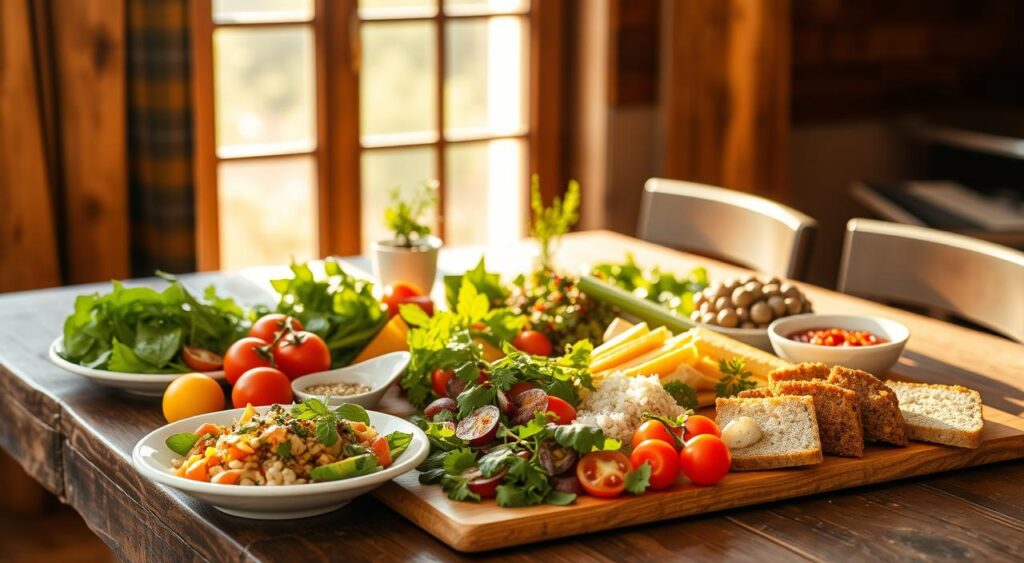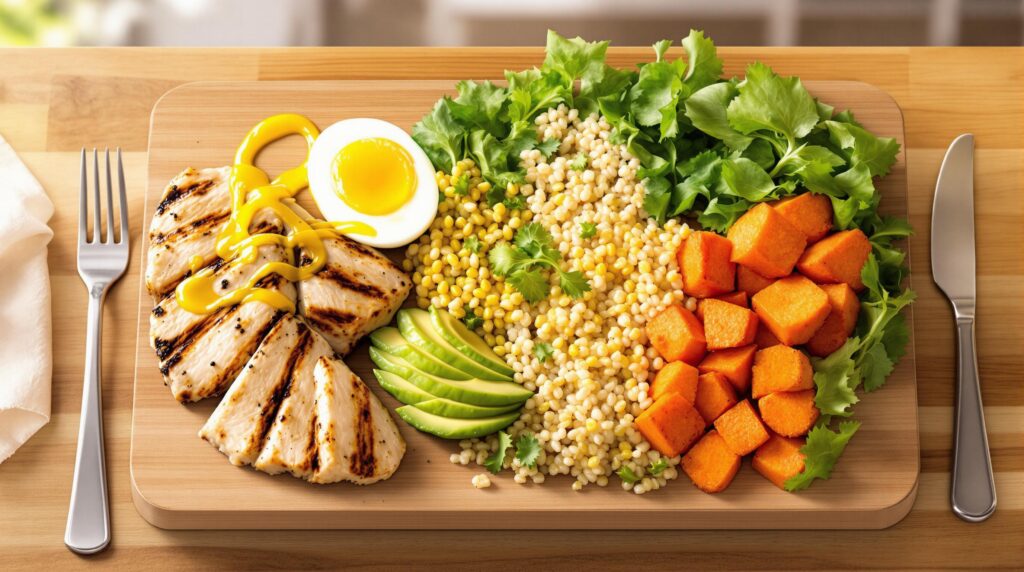Ever wondered why the Mediterranean diet is so healthy? It’s not just about counting calories. It’s about enjoying the rich flavors and health perks of Mediterranean food. With fresh veggies, whole grains, legumes, lean fish, and olive oil, you start a tasty journey to better health.
This article offers a detailed 7-day meal plan with tasty recipes and a must-have grocery list. It makes eating both fun and easy. Whether you aim to improve your heart health or just love trying new dishes, this guide has you covered. It helps you create a lifestyle that’s good for you and delicious.
What is the Mediterranean Diet?
The Mediterranean diet is based on the eating habits of countries near the Mediterranean Sea. It focuses on plant-based foods and healthy fats. This makes for a balanced and fun way to eat healthy.
It includes whole grains, legumes, vegetables, fruits, and fish. These foods help you stay healthy and feel good.
Understanding the Basics
The Mediterranean diet means eating more plants and less red meat and sweets. Extra virgin olive oil is a key healthy fat. It’s good for your heart.
Whole grains like whole-wheat bread and brown rice are also important. Fish with omega-3 fatty acids help your heart too.
Health Benefits of the Mediterranean Diet
This diet has many health benefits. It can lower your risk of heart disease and help you keep a healthy weight. It also keeps your blood sugar, blood pressure, and cholesterol levels stable.
It might even slow down cognitive decline as you get older. Eating this way can help you live longer and healthier. For more on these benefits, check out this resource on Mediterranean diet health benefits.
Key Principles of the Mediterranean Diet
The Mediterranean diet focuses on key principles for health and well-being. It emphasizes whole foods, which are the heart of nutritious meals. By using a variety of fresh ingredients, you can enjoy a wide range of flavors while getting the best nutrition.
The diet also highlights the importance of healthy fats from natural sources. This adds to the diet’s framework, making it even more beneficial.
Emphasizing Whole Foods
Whole foods are at the center of the Mediterranean diet. They make meals not just filling but also full of important nutrients. By choosing fresh vegetables, fruits, whole grains, legumes, nuts, and seeds, you give your body a boost of energy.
Whole foods are rich in dietary fiber, which is good for your digestive health and helps keep your weight in check. This diet promotes using wholesome ingredients for a balanced nutrition plan.
Favoring Healthy Fats
Healthy fats are key in the Mediterranean diet, coming from sources like olive oil, avocados, and nuts. These fats are full of essential fatty acids that are good for your heart and overall health. Adding these fats to your meals makes your dishes not only tasty but also nutritious.
By avoiding processed fats and choosing natural ones, you get to enjoy the rich flavors of Mediterranean cuisine. This makes your meals more satisfying and enjoyable.

Creating Your 7-Day Meal Plan
When planning a 7-day meal plan with Mediterranean cuisine, pick meals that taste great and are good for you. This way, you can make dishes ahead of time. You’ll also enjoy different flavors all week.
Breakfast Ideas
Start your day with tasty breakfast ideas that boost your energy. Try Mediterranean savory breakfast bowls with fresh veggies and whole grains. Or, go for Greek yogurt with fruits and nuts for a quick, healthy choice. These options will keep you full until lunchtime.
Lunch Options
For lunch, choose hearty dishes that follow the Mediterranean diet. A farro salad with arugula, cherry tomatoes, and feta cheese is both flavorful and nutritious. Greek salmon salad is another great choice, with protein and healthy fats to keep you satisfied.
Dinner Suggestions
Evenings can be filled with delicious dinner suggestions. Think about lemon garlic salmon with grilled veggies or a warm bowl of ribollita, a Tuscan soup with beans and greens. These meals capture the spirit of Mediterranean cuisine and make cooking fun.
Creating this meal plan is a step towards healthier eating without losing flavor. For more ideas, check out this meal plan.
Grocery List Essentials for the Mediterranean Diet
Having a good grocery list is key to following the Mediterranean diet. It makes sure your meals are tasty and healthy. Here are the main things to buy.
Fresh Produce
Fill your cart with colorful, fresh fruits and veggies. Choose a variety for a balanced diet. Here are some must-haves:
- Leafy greens (spinach, kale, arugula)
- Tomatoes
- Cucumbers
- Bell peppers
- Berries (strawberries, blueberries, raspberries)
- Citrus fruits (lemons, oranges)
Pantry Staples
It’s important to stock up on pantry staples for Mediterranean cooking. Make sure to include these:
- Legumes (beans, chickpeas, lentils)
- Whole grains (quinoa, farro, brown rice)
- Healthy fats (extra virgin olive oil, nuts, seeds)
- Herbs and spices (oregano, basil, garlic)
Proteins to Include
Choose a variety of proteins for nutritious meals. Here are some good options:
- Seafood, like fatty fish (salmon, mackerel)
- Lean poultry (chicken, turkey)
- Eggs
- Plant-based proteins (tofu, tempeh)

Delicious Mediterranean Diet Recipes
Cooking Mediterranean diet recipes is fun and rewarding. You’ll find many tasty meals for breakfast, lunch, and dinner. These dishes are not only healthy but also simple to make. Adding healthy cooking to your daily routine brings flavorful and nutritious options that everyone will enjoy.
Breakfast Recipes
Begin your day with vibrant and nutritious breakfasts. Try these options:
- Greek yogurt topped with homemade granola and fresh berries
- Avocado toast with cherry tomatoes and a sprinkle of feta cheese
- Quinoa breakfast bowls with nuts and fruits
Lunch Recipes
Lunchtime is perfect for dishes that showcase the Mediterranean’s rich flavors. Here are some great choices:
- Easy Mediterranean tuna salad sandwiches with olives and capers
- Ribollita, a hearty Tuscan vegetable soup filled with beans and kale
- Chickpea salad with cucumber, tomatoes, and a lemon vinaigrette
Dinner Recipes
Make dinner special with these Mediterranean recipes that celebrate fresh ingredients. Try these:
- Baked lemon chicken served over seasoned toasted orzo
- Grilled scallops accompanied by Mediterranean tomato salsa
- Stuffed bell peppers with quinoa, vegetables, and feta cheese

Snacks and Treats on the Mediterranean Diet
Adding snacks and treats to your Mediterranean diet can make it more fun. It keeps your health goals in check. Healthy snacks and desserts let you enjoy tasty flavors while eating well.
Healthy Snack Ideas
- Roasted chickpeas seasoned with spices
- Fresh vegetables like cucumbers and bell peppers served with homemade hummus
- A handful of mixed nuts, such as almonds and walnuts
- Sliced apples or pears with a sprinkle of cinnamon
- Whole grain pita chips served with tzatziki
Dessert Options
- Fresh fruit drizzled with honey for a natural sweetness
- Homemade baklava made with phyllo dough, nuts, and light syrup
- Greek yogurt topped with berries and a sprinkle of granola
- Dark chocolate dipped strawberries for a decadent treat
- Lemon sorbet for a refreshing finish
These Mediterranean treats offer a variety of tastes and nutrients. They help you eat well and enjoy snacks and desserts without guilt!

Tips for Meal Prep and Planning
Effective meal prep is key to sticking to the Mediterranean diet. Organizing your ingredients makes cooking easier and boosts healthy eating. Spend time preparing ingredients before the week starts. This way, you can quickly make healthy meals even when you’re busy.
Preparing Ingredients Ahead of Time
Start by chopping veggies, cooking grains, or marinating proteins for the week. Here are some tips for efficient prep:
- Chop veggies and store them in airtight containers. This keeps them fresh and ready to use.
- Prepare grains like quinoa or brown rice in bulk, portioning them out for various meals.
- Marinate your proteins in advance, making them easy to cook and flavorful.
- Prepare salad ingredients separately, combining them just before serving to maintain texture.
Storage Tips for Freshness
Proper storage is vital for keeping your ingredients fresh. Follow these tips to keep your meal prep fresh:
- Use airtight containers to prevent moisture loss and spoilage.
- Label containers with dates to track freshness and ensure you consume older items first.
- Store herbs and greens in damp paper towels inside containers for longer-lasting crispness.
- Keep meal portions labeled and organized in the fridge for easy access during meal times.
By using these meal prep and planning strategies, you can enjoy the Mediterranean diet without stress. You’ll have fresh, nutritious meals every day.
How to Stay Motivated on Your Diet Journey
Staying motivated on your diet journey is key to lasting success. The Mediterranean lifestyle is full of vibrant flavors, making it fun to stay on track. Setting realistic goals helps you see progress and celebrate small wins.
Setting Realistic Goals
Starting a new diet? Begin by setting realistic goals. Aim for slow, steady changes, not overnight miracles. Small steps, like eating more Mediterranean foods, boost your motivation. It’s about moving towards a healthier life, not being perfect.
Tracking Your Progress
Tracking your progress can really help keep you motivated. Try a food journal or apps for tracking your diet. Seeing your food choices and body’s response can be empowering. It shows you’re on the right path.
Common Mistakes to Avoid on the Mediterranean Diet
Starting the Mediterranean diet can bring many health benefits. But, some common mistakes can stop you from getting the most out of it. Knowing these mistakes is key to eating healthier.
Overlooking Portion Control
One big mistake is not paying attention to portion sizes. Eating too much, even healthy foods, can cause weight gain. The Mediterranean diet focuses on good foods, but it’s important to watch how much you eat.
By eating the right amounts, you can enjoy the diet’s benefits. It helps you have a healthy relationship with food and keeps your weight in check.
Ignoring Variety
Another mistake is not trying different foods. Eating the same things all the time can miss out on important nutrients. The Mediterranean diet is all about trying new things.
By mixing up your meals, you keep your diet interesting and full of nutrients. This makes your Mediterranean diet journey fun and rewarding.
To avoid these mistakes, aim for a balanced diet. Include a variety of fruits, veggies, whole grains, and healthy fats. This not only makes your meals better but also gives your body the nutrients it needs.
Remember, watching your portions and trying new foods is key. It makes your Mediterranean diet journey enjoyable and successful.
Adapting the Mediterranean Diet to Your Lifestyle
The Mediterranean diet is known for its health benefits. You might wonder how to make it fit your unique needs. Luckily, you can adapt your diet to your lifestyle and preferences. Whether you prefer vegetarian or vegan options, you can enjoy tasty recipes that keep the Mediterranean spirit alive.
Vegetarian and Vegan Options
If you’re into plant-based eating, the Mediterranean diet has plenty to offer. Imagine enjoying lentil salads with fresh herbs, stuffed bell peppers with quinoa, or vegetable-rich stews. These dishes are as hearty and nutritious as their meat-based versions.
Modifying for Allergies and Preferences
Adapting the Mediterranean diet is easy if you have food allergies or specific preferences. You can swap dairy for almond milk or coconut yogurt. If gluten is a problem, try using quinoa or brown rice instead of whole grains. These changes make the Mediterranean diet flexible and suitable for your lifestyle.




Pingback: Pescatarian Diet: Benefits + 3-Day Meal Plan
Pingback: South Beach Diet: Modernized for 2025
Pingback: Mediterranean Diet: Starter Guide + 3-Day Menu